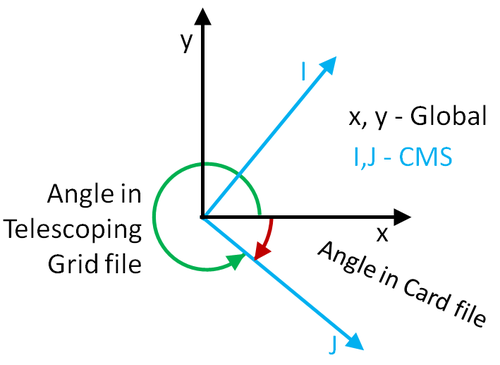CMS-Flow Angle Conventions: Difference between revisions
Jump to navigation
Jump to search
Created page with "File:cms flow angle conventions.jpg" |
mNo edit summary |
||
| (7 intermediate revisions by 4 users not shown) | |||
| Line 1: | Line 1: | ||
[[File: | [[File:CMS_angle_convensions.png|center|500px | Figure 1. CMS-Flow local coordinate system and grid angle conventions used in the Card and Telescoping Grid Files. The I and J axis indicate the CMS grid axis, while the X and Y axis indicate the global coordinate system.]] | ||
CMS-Flow uses a local coordinate system in which all vector values are positive along the I and J axis. All output vector arrays are specified in the local coordinate system. Any input that is specified on the local grid must be specified in the local coordinate system (e.g. initial condition for currents, interpolated wave forcing, etc). If input vector arrays are specified on a different grid, such as a spatially variable wind field or waves on a CMS-Wave grid, then the vectors are assumed to follow the coordinate system of their native grid. The grid is always created in SMS with the origin is by default always at the lower left hand corner of the grid. | |||
---- | |||
Latest revision as of 19:42, 9 March 2020

CMS-Flow uses a local coordinate system in which all vector values are positive along the I and J axis. All output vector arrays are specified in the local coordinate system. Any input that is specified on the local grid must be specified in the local coordinate system (e.g. initial condition for currents, interpolated wave forcing, etc). If input vector arrays are specified on a different grid, such as a spatially variable wind field or waves on a CMS-Wave grid, then the vectors are assumed to follow the coordinate system of their native grid. The grid is always created in SMS with the origin is by default always at the lower left hand corner of the grid.